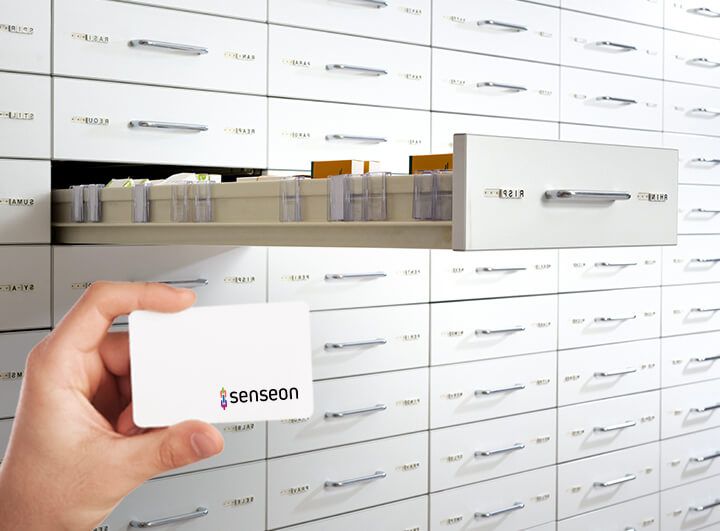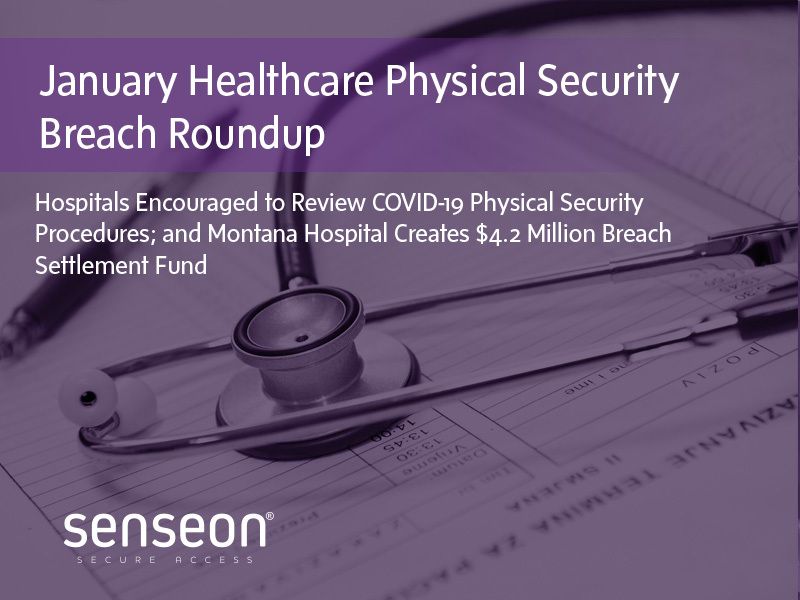Hospitals Encouraged to Review COVID-19 Physical Security Procedures; and Montana Hospital Creates $4.2 Million Breach Settlement Fund
Take control of the physical data breach and drug diversion risks that threaten your healthcare organization with Senseon’s Physical Security Breach Roundup.
We bring you the most recent physical data breach and drug diversion news each month. If you want to learn more about what you can do to minimize the risk of your facility ending up on this list, we can help.
Physical Breach & Security News
Hospitals Urged to Review Physical Security Procedures Ahead of COVID-19 Vaccine
There’s been a lot of secrecy around the COVID-19 vaccine, mostly because of physical and cyber security worries.
Agencies around the country are working to make sure the vaccine is stored securely, with information being released carefully. The level of transparency varies by state, with some state law enforcement taking extra precaution.
For example, the South Carolina Law Enforcement Division has encouraged hospitals to review physical safety procedures and they’ve released a COVID-19 Vaccine Cyber Situational Awareness Report. These measures will help ensure hospitals can distribute the vaccine as efficiently and securely as possible.
Colorado Hospital Addresses Breach After Surveyor Loses Storage Device
Although the new year has already begun, the Cedar Springs Hospital is still working to address the aftermath of a physical data breach that occurred in October 2020.
The Colorado health department has asked that the hospital provide copies of records held on an external device that was lost by a health department surveyor. The device contained names, addresses, birthdates, and Social Security numbers, along with additional medical information including treatment history and diagnoses.
Unfortunate incidents such as this one highlight the continued importance of implementing comprehensive safeguards to secure electronic devices that store confidential patient data.
Montana Hospital Creates $4.2M Data Breach Settlement Fund
In response to a 2019 breach, Kalispell Regional Healthcare has created a settlement fund for impacted patients. The breach exposed the Protected Health Information (PHI) of about 130,000 individuals.
The $4.2 million fund can be used to reimburse patients for out-of-pocket losses, attested time and identification restoration services related to the breach, and other benefits. As a part of the settlement, the health system denies wrongdoing in relation to the breach.
Almost 1 Million Records Breached in November
As we enter 2021, we’re still seeing large numbers of healthcare record breaches.
Beckers Hospital Review reports that, in November alone, 30 organizations reported breaches to HHS with a total of 970,000 individuals affected. The largest breach took place at AspenPointe in Colorado Springs, impacting 295,617 individuals.
Pharmacy Times Recommends RFID for Tracking During COVID-19 Pandemic
Pharmacy Times has published advice to help hospitals better keep track of medications and address drug shortages during the COVID-19 pandemic.
The article covers current challenges, the impact of COVID-19, and the important role of pharmacists in medication inventory. The article also offers RFID security systems as a promising solution to help hospitals combat physical security challenges.

RFID security solutions like Senseon Core enable pharmacies to monitor access to controlled substances.
Drug Diversion News
Man Steals Drugs While Visiting Dying Family Member
Officials from Georgetown County Sheriff’s Office have reported that Matthew Brandt stole hospital property and controlled substances while visiting a dying relative at Tidelands Waccamaw Community Hospital.
The South Carolina sheriff’s office was notified shortly after the theft took place and used hospital security surveillance videos to identify the 27-year-old man. Brandt was found in possession of the stolen items, which included a partially used Fentanyl drip bag.
CVS Implements Time Delay Safes To Prevent Drug Diversion
CVS Health has installed time delay safe technology in all 79 Oklahoma CVS Pharmacy locations, including those within Target stores. The safes are intended to prevent pharmacy robberies and address associated diversion of controlled substance medications like oxycodone and hydrocodone.
The devices create a delay in the time it takes an employee to open them, providing an additional layer of security. The technology was first implemented in 2015 in Indianapolis to help address a high volume of pharmacy robberies. In the stores where time delay safes had been installed, there was a 70% decline in robberies—a positive sign for those looking to combat drug diversion.
To learn more about ways hospitals and pharmacies can reduce drug diversion, read this.






